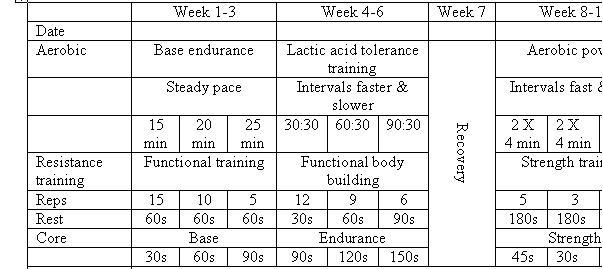|
Rugby fitness training – Periodization
Periodization is the key to exercise and it is used by every professional
athlete, yet almost no one outside of this circle has heard of it.
The science of periodization was developed in the USSR and former
Eastern Block countries as a system to design training programmes
for their athletes.
The principles are based on the fundamental way the body responds to exercise. As we all respond similarly to exercise the principles must be used for everyone’s training programmes and not just that of the elite athletes.
The Need for Periodization
If you are some one who has embarked on an exercise routine and enjoyed it at first but found you became bored eventually as you stopped making improvements, you have seen exactly why periodization is needed.
Periodization was designed to ensure athletes continued to make gains from their training. It is the all encompassing theory of how to combine the theory of adaptation, progressive overload, diminishing returns
and allowing for sufficient rest and recovery.
What it means for you is if applied correctly, is that you will make the greatest gains ever that you have had from the gym and exercise. It will also allow you to enjoy the exercise and remain clear from injury. Before looking at the theory, let us quickly examine the principles behind exercise.
Periodization
Periodization is the theory and principles of how to structure your training programme so improvements are made from month to month and year to year while avoiding over-training and injuries.
The theory sees the year being broken up into different periods of time
(phases), where unique training routines can be used that are different from one phase to the next. This ensures the principles outlined above can be adhered to.
The basic principles are very simple to use. Professional athletes may
use a highly sophisticated form but everyone should be using it to some degree.
Phases
Under periodization your year is divided into phases. Each phase has a
different focus and training programme to perform. As well as these,
planned periods of rest are also designed, this can be timed to
coincide to holidays, work demands and more. Using phases during
the training year is the key to getting the most out of your exercise
routine.
Training Variables
This relates to the way you change the actual variable of how you do
your exercise routine, these refer to the amount of exercise you
perform (volume), the difficulty of exercise you perform compared
to your maximum (intensity), the type of exercise you do (specificity)
and rest taken (density).
Each of these variables can be applied to the key areas of exercise;
aerobic, sprint, resistance, agility, plyometric and core training.
Training Techniques
Guided by how you aim to vary the training variable during the year, different training techniques are used within each phase to attain a specific training outcome, e.g. in one phase you may perform maximum strength training and maximum speed training while in another you focus on increasing muscle size and speed endurance training.
A Periodized Plan
The combination of above mentioned techniques allows a fully periodized
plan to be produced where you can set out a whole year’s training
ahead. This tells you exactly how to vary the programme from week
to week and month to month to ensure you have great success. The
outline is subject to revisions as progress occurs and the body
shows how it is handling the exercise.

If you would like a fully periodized routine to follow for yourself
then think about following one of my rugby courses where you will receive your own plan. |